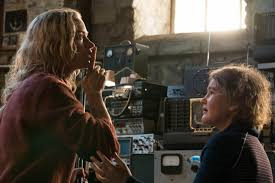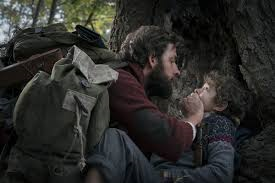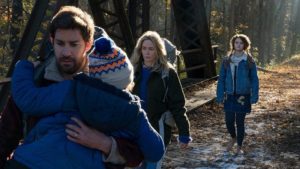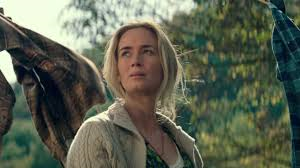Movie Review: A Quiet Place

How would you live in a world where quietness and stillness were absolute essentials to your survival? How would you communicate with others? What sorts of implications would this have on interpersonal and familial relationships? For how long could such an existence be sustained? These are some of the questions which are tackled in writer-director John Krasinski’s new film which co-stars his wife in real life Emily Blunt. Blunt and Krasinski play wife and husband Evelyn and Lee Abbott. In a post-apocalyptic scenario, the world as we know it has been invaded by extraterrestrial creatures that employ their aural acuity to sense out and hunt their prey. The creatures are blind and, mercifully, Krasinski avoids any unnecessary exposition as to how they arrived on earth. The pertinent point to all concerned is that they are here and, in order to survive, the remaining inhabitants must observe a regime of silence at almost all times and in the majority of locations. The Abbott family have a trump card up their sleeve which explains how they may have persevered longer than most. Their daughter Regan (the excellent Millicent Simmonds) is deaf and the family members are all versed in sign language. It’s a crucial skill in this world where silence must be maintained for the most part. But at what cost does this come?

Krasinski – who has cited Jaws, Don’t Breathe and Get Out as influences on his work – opens with an expertly realised sequence (one of several such throughout the film) in which the family of five forage in a deserted store for much-needed provisions. One telling tragedy later and the family unit is no longer as resilient as it once was. We move forward in time to over a year later. There are tensions hanging in the air between father and daughter; but, of course, there is very little opportunity for venting emotions or giving open expression to residing grievances. The environment which the family occupies is simply too fraught with danger for such articulation. There are more pressing issues at hand apart from this. Evelyn is heavily pregnant with the couple’s fourth child and carefully devised arrangements must be put in place for an arriving newborn that simply will not understand the need to hold back its tears. Elsewhere, Lee is intent on the need for his son Marcus (Noah Jupe) to grow up fast and become resourceful in this radically changed world. Dad takes the boy fishing and teaches him how they will be safe as long as louder sounds cloak their conversations and movements. And this is one of the unique features of A Quiet Place which Krasinski and his co-writers Bryan Woods and Scott Beck manage to portray and project so effectively. A Quiet Place is almost bereft of dialogue. Each of the family members must observe a vow of silence of sorts which is essential to their very existence. Fail to comply with the rules of this universe and you will be at the mercy of the hideous creatures which attack almost as soon as they hear any sort of auditory commotion.

One of the most interesting aspects of post-apocalyptic pieces such as this one is for the viewer to discern the means by which characters in the story have reinvented themselves and tailored their immediate environs to bolster their prospects of survival. Led by father Lee, the Abbotts have become very adept in this regard and Krasinski the director provides us with many visual illustrations with respect to this. But, as with all such tales, pressure points will come to bear and the second half of this extremely concise 90-minute film does not hold back in terms of its spine-tingling moments and sources of peril. But, happily, there are no cheap shots in this regard. Krasinski respects his audience greatly and does not lower himself to the banal or the hackneyed. Instead, we are presented with an expertly staged denouement involving the birth of a child, a corn field and a treacherous silo among other things. The emotional core of the story meantime is maintained by an unselfish sacrifice which resonates well with the film’s essential theme – the preservation of the family unit; the endeavours of parents to ensure the safety and well-being of their children.

This constant thread which underpins and informs the narrative thrust is best summed up in one of the few lines of dialogue uttered by Evelyn after she has given birth – ‘Who are we if we can’t protect our children?’ she enquires of Lee. The dutiful husband and father knows full well the significance of this question and the responsibility he must shoulder. The pro-life message which A Quiet Place subtly propagates has been commented upon by critics and, in the deft story-telling hands of Krasinski and his fellow writers, it is one of the particular joys and strengths of this outstanding suspense-thriller. On the technical side of things, kudos have also to be extended to composer Marco Beltrami for his suitably atmospheric score, to Christopher Tellefsen for his taut editing and to the production design and set decoration of Jeffrey Beecroft and Heather Loeffler respectively. The four central cast members are exemplary, particularly when one considers the almost total absence of dialogue, and on helming duties Krasinski brings his A game with regard to dramatic action and astute attention to detail. One of the best films in this particular genre for years, A Quiet Place should make many a top ten critics list by the end of 2018. Full-toned and of weighty import despite its dearth of open communication.
Rating: A+